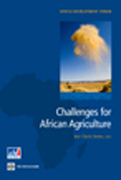
What is the future for Sub-Saharan African farms? What role can they play in the development of the subcontinent? These are crucial issues which require answers.The issue of feeding the planet has once again become crucial. The first challenge for these farms is consequently to produce more and better in order to feed Africa’s growing population. They can achieve this by developing a huge natural potential, exploiting the margins made possible by agricultural progressand fighting to obtain secure agricultural prices.With an ever-increasing agricultural population, the second challenge is to promote the available human capital within the smallholding farms. This capitalis currently wasted due to the lack of training opportunities, innovation anda favourable social, economic and regulatory situation.With the threat of a lack of employment, food-related problems, conflicts, exoduses and desertification, the third challenge is how to manage to make theseefforts to develop and promote sustainable, both in the field and in the whole economy. This requires implementing coherent agricultural, social and environmental policies and integrated regional management.African farmers and the leaders of their organisations are key players in terms of meeting these three challenges and bringing about these essential changes on farms, in regions and in the way agricultural industries are managed. They carry a vision of the future of their farming and the rural world which is essential for orienting the transitions in Africa’s rural economies.This collective work will have met its objective if it helps change the way we view the potential of Africa’s smallholding farms and if all those needed topromote it are given incentives to make long-term commitments.
- ISBN: 978-0-8213-8481-7
- Editorial: World Bank
- Encuadernacion: Rústica
- Páginas: 267
- Fecha Publicación: 01/12/2010
- Nº Volúmenes: 1
- Idioma: Inglés
